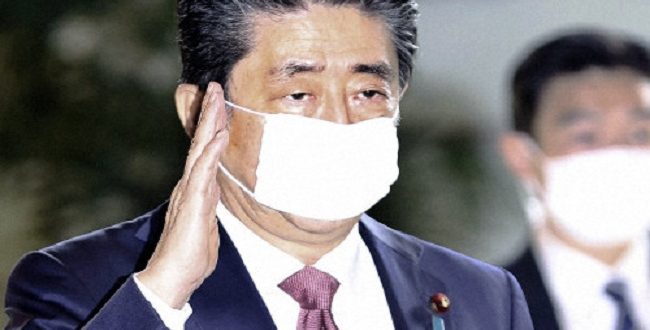Japan poised to declare state of emergency over COVID-19.
Prime Minister Shinzo Abe declared a state of emergency on Tuesday for Tokyo, Osaka and five other prefectures to curb the spread of the new coronavirus after an alarming growth in cases in urban areas.
The declaration, effective through May 6, will enable prefectural governors to take stronger preventive steps, ranging from instructing citizens to stay at home to restricting the operation of schools and other facilities, though there are no legal penalties for non-compliance.
Measures to be taken based on the first-ever such declaration in Japan could curtail people’s rights and freedoms to some extent. But it will not lead to hard lockdowns on a scale seen in other countries hit by the virus like China and France due to the limits of the Japanese law.
During a meeting of a government task force on COVID-19, Abe declared a state of emergency based on a recently amended law to respond to the coronavirus outbreak. He consulted an advisory panel of experts in infectious diseases and public health who gave the go-ahead earlier, completing the required process.
“We are in a situation in which the spread of infections is rapid and widespread across the country, threatening to seriously impact people’s lives and the economy,” Abe told the task force meeting.
Abe said people need to change their behavior to prevent the virus from spreading further by refraining from going outside and reducing contact with people.
“We are not planning to carry out lockdowns similar to those overseas and will maintain services such as public transportation that are necessary for our economy and society as much as possible,” Abe said.
The prime minister is scheduled to hold a press conference at 7 p.m. on Tuesday to publicly explain his decision in detail.
People in the Tokyo metropolitan area — Tokyo, Chiba, Kanagawa and Saitama — as well as in Osaka, Hyogo and Fukuoka, will be requested to refrain from unnecessary outings. Grocery shopping, visits to hospital, and commuting are excluded.
Abe also said the government does not plan to ask train operators to reduce services.
Medical experts sitting on the government panel have warned of an explosive surge as cases in which transmission routes cannot be traced have grown. Sharp rises in infections have been seen in urban areas including Tokyo and Osaka.
They also took issue with some people already relaxing vigilance in a battle against the virus that has spread from China since late last year.
In Japan, the total number of infections has topped 4,800, including about 700 from the Diamond Princess, a cruise ship that was quarantined in February near Tokyo. The death toll stands at 108.
An amendment to a law in mid-March gave Abe the authority to declare a state of emergency for specific areas for a limited period of time. He waited until Tuesday to use that power for the first time, apparently worried about its impact on people’s everyday lives and the country’s economy.
The government finalized its biggest-ever 108 trillion yen ($989 billion) stimulus package to bolster its measures against COVID-19 and mitigate the economic fallout from the outbreak.
The package reflects measures that do not involve fiscal spending such as corporate tax payments with extended grace periods.
Up to now, Abe has said Japan was on the brink of a wide-scale outbreak but had been holding the line against the global pandemic.
But the governors of Tokyo and Osaka ramped up calls on Abe to make the emergency declaration and the Japan Medical Association has warned of a collapse in the healthcare system. Opposition lawmakers have lambasted Abe for his slow response.
In addition to making stronger stay-at-home requests, the governors in the seven prefectures can restrict the use — and request temporary closure — of institutions such as schools, social welfare facilities, theaters, music venues and sports stadiums where large numbers of people gather.
People will not be punished even if they do not fall in line, and neither can business activity be banned.
But there are some powerful actions the state of emergency declaration allows. The governors can expropriate private land and buildings for use in the virus fight if their owners refuse to allow the property to be utilized without legitimate reasons.
The governors can also requisition medical supplies and food from companies that refuse to sell them and punish those that hoard or do not comply. They can force firms to help transport emergency goods.
Some prefectural governors have already made voluntary requests that people stay at home and schools remain shut to reduce transmission risks. Hokkaido is the only prefecture whose governor made a nonbinding state of emergency declaration to demonstrate the seriousness of the situation in March and asked local people to stay at home over weekends.
The global coronavirus pandemic led the International Olympic Committee to delay until 2021 the Tokyo Olympics and Paralympics initially scheduled for this summer.
After the largest daily increase of 143 cases on Sunday, Tokyo confirmed 83 cases on Monday. The Japanese capital, with a population of about 14 million, has reported 1,116 cases so far, by far the largest among the country’s 47 prefectures.
Abe has vowed to increase the number of hospital beds, boost virus testing capacity and speed up the development of vaccines and drugs for use in treatment.
The government plans to increase its stockpile of the anti-flu drug Avigan which can be administered to COVID-19 patients.
The Tokyo metropolitan government has decided to isolate people who have tested positive for the virus but have mild or no symptoms in hotel rooms, allowing hospitals more capacity to accept patients suffering more severe symptoms.
 Canada Journal – News of the World Articles and videos to bring you the biggest Canadian news stories from across the country every day
Canada Journal – News of the World Articles and videos to bring you the biggest Canadian news stories from across the country every day



